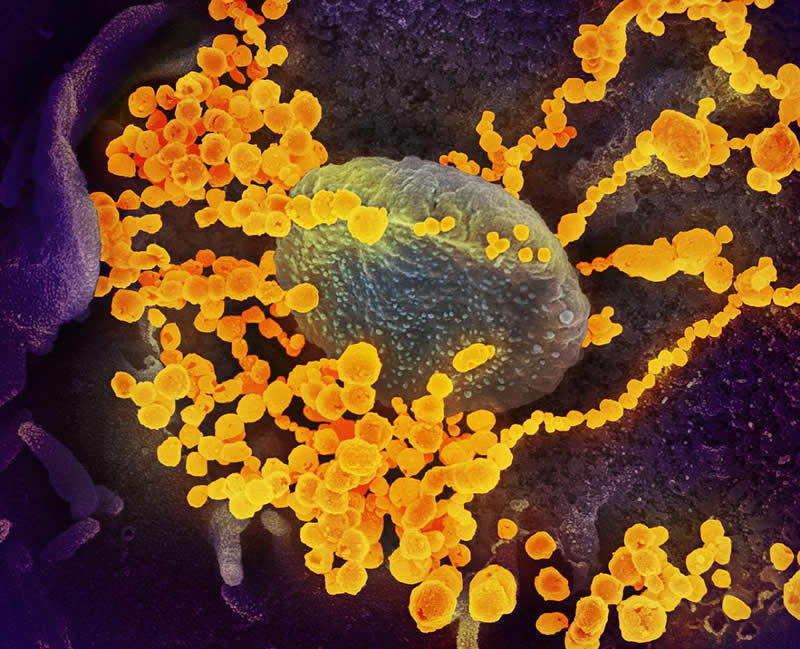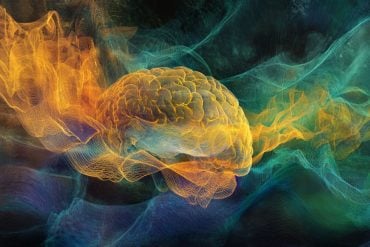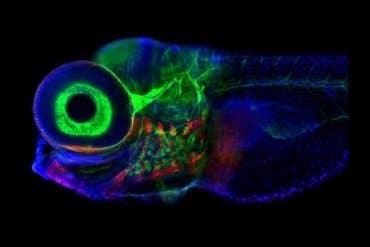Summary: Macaque monkeys infected with mild-to-moderate coronavirus responded well to the antiviral Remdesivir. Researchers report the monkeys showed reduced clinical symptoms and less lung damage when the drug was administered. The findings back up other reports which claim the drug is effective at treating human COVID-19 infections in current clinical trials.
Source: NIH/NIAID
Early treatment with the experimental antiviral drug remdesivir significantly reduced clinical disease and damage to the lungs of rhesus macaques infected with SARS-CoV-2, the coronavirus that causes COVID-19, according to National Institutes of Health scientists.
The study was designed to follow dosing and treatment procedures used for hospitalized COVID-19 patients being administered remdesivir in a large, multi-center, clinical trial led by NIH/NIAID’s National Institute of Allergy and Infectious Diseases (NIAID). The scientists posted the work(link is external) on the preprint server bioRxiv. The findings are not yet peer-reviewed and should not be considered clinical advice, but are being shared to assist the public health response to COVID-19. A study detailing the development of the rhesus macaque model of mild- to-moderate human disease, conducted by the same team of NIAID scientists, was posted to bioRxiv on March 21.

The current study of remdesivir, a drug developed by Gilead Sciences Inc. and NIAID-supported investigators, involved two groups of six rhesus macaques. One group of monkeys received remdesivir and the other animals served as an untreated comparison group. Scientists infected both groups with SARS-CoV-2. Twelve hours later the treatment group received a dose of remdesivir intravenously, and then received a daily intravenous booster dose thereafter for the next six days. The scientists timed the initial treatment to occur shortly before the virus reached its highest level in the animals’ lungs.
Twelve hours after the initial treatment, the scientists examined all animals and found the six treated animals in significantly better health than the untreated group, a trend that continued during the seven-day study. They report that one of the six treated animals showed mild breathing difficulty, whereas all six of the untreated animals showed rapid and difficult breathing. The amount of virus found in the lungs was significantly lower in the treatment group compared to the untreated group, and SARS-CoV-2 caused less damage to the lungs in treated animals than in untreated animals.
The investigators note that the data supports initiating remdesivir treatment in COVID-19 patients as early as possible to achieve maximum treatment effect. The authors, from NIAID’s Rocky Mountain Laboratories in Hamilton, Montana, also note that while remdesivir helped prevent pneumonia, it did not reduce virus shedding by the animals. “This finding is of great significance for patient management, where a clinical improvement should not be interpreted as a lack of infectiousness,” they write.
About this coronavirus research article
Source:
NIH/NIAID
Media Contacts:
Ken Pekoc – NIH/NIAID
Image Source:
The image is credited to NIAID-RML.
Original Research: Closed access
“Clinical benefit of remdesivir in rhesus macaques infected with SARS-CoV-2”. by B. Williamson, et al.
PNAS doi:10.1101/2020.04.15.043166.
Abstract
Clinical benefit of remdesivir in rhesus macaques infected with SARS-CoV-2
Background
Effective therapeutics to treat COVID-19 are urgently needed. Remdesivir is a nucleotide prodrug with in vitro and in vivo efficacy against coronaviruses. Here, we tested the efficacy of remdesivir treatment in a rhesus macaque model of SARS-CoV-2 infection.
Methods
To evaluate the effect of remdesivir treatment on SARS-CoV-2 disease outcome, we used the recently established rhesus macaque model of SARS-CoV-2 infection that results in transient lower respiratory tract disease. Two groups of six rhesus macaques were infected with SARS-CoV-2 and treated with intravenous remdesivir or an equal volume of vehicle solution once daily. Clinical, virological and histological parameters were assessed regularly during the study and at necropsy to determine treatment efficacy.
Results
In contrast to vehicle-treated animals, animals treated with remdesivir did not show signs of respiratory disease and had reduced pulmonary infiltrates on radiographs. Virus titers in bronchoalveolar lavages were significantly reduced as early as 12hrs after the first treatment was administered. At necropsy on day 7 after inoculation, lung viral loads of remdesivir-treated animals were significantly lower and there was a clear reduction in damage to the lung tissue.
Conclusions
Therapeutic remdesivir treatment initiated early during infection has a clear clinical benefit in SARS-CoV-2-infected rhesus macaques. These data support early remdesivir treatment initiation in COVID-19 patients to prevent progression to severe pneumonia.
Competing Interest Statement
The authors affiliated with Gilead Sciences are employees of the company and own company stock. The authors affiliated with NIH/NIAID have no conflict of interest to report.
Feel Free To Share This COVID-19 News.






